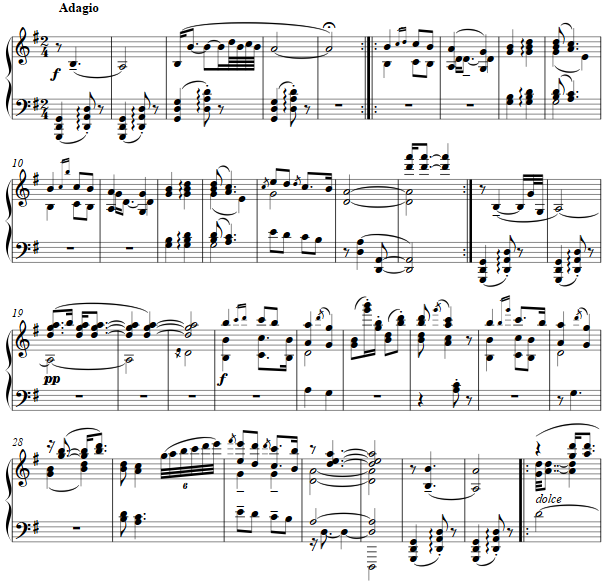Music and Texts of GARY BACHLUND
Vocal Music | Piano | Organ | Chamber Music | Orchestral | Articles and Commentary | Poems and Stories | Miscellany | FAQs
On "Ličko Kolo" - (2018)
for piano
The "kolo" is a circle [dance], which is done in social gatherings, sung in a call and response fashion, some with and some without instrumental accompaniment. The lyric to this melody: "Pjevaj mi, pjevaj, sokole, / Salaj, sokole / Ka'o što si sinoc pjevao...." Sing to me, oh sing, falcon, sing as you sang last night. Some have stated that this particular lyric and melody is performed as dance with a cappella voices, in recollection of the suppression of some forms of music in Croatia under the Ottoman rule.
Certainly, the class between these civilizations has a long history, as a Wikipedia article chronicles many historic wars between Croatia and the Turks, in "Croatian–Ottoman Wars" -- Long Campaign (1443–1444) of the King Vladislaus II of Hungary, Hundred Years' Croatian–Ottoman War, War for Croatia - a period of near constant mostly low-intensity warfare ('Small War') approximately 1493–1593 (from the Battle of Krbava Field to the Battle of Sisak), Long War (1593–1606), Austro-Turkish War (1663–1664), Great Turkish War (1683–1699), Austro-Turkish War (1716–1718), Austro-Turkish War (1787–1791), and Austro-Hungarian campaign in Bosnia and Herzegovina in 1878."
Was there a disconnect between cultures and music? Most certainly there was, as one reads: "...an 18th century manuscript kept in the Gazi-Husrev bey’s library in Sarajevo. It is Code 380, a collection of seven different books in the field of Koran interpretation. The seventh book in the collection is ilmihal (religion textbook) in Turkish by an unknown author, transcribed by hadži Sulejman, Muhammed’s son, in Gradačac, on ševal 23rd, 1180 Hagira year (March 24th, 1767). One paragraph of the ilmihal says that ‘a man who was using a kind of saaz in this world will be given the same saaz on the Doomsday and will play it; music will be on his mind at his death hour, and therefore he risks losing the faith. Will he be able, then, to think of God, or will he die thinking of saaz? Will he be able to listen carefully to prayers of Kelima – and šehadet 19 that those present besides him will pray at that hour? Will he be afraid of devil and saaz possessing him and moving to the Other World without faith.’ (Dobrača 1963: 141-142) Such an unfounded attitude toward saaz and music in general was spread among Muslims as an Islam attitude." In "Ottoman Influence on Folk Music Tradition of Bosnia and Herzegovina," by Tamara Karača-Beljak and Jasmina Talam, Academy of Music, University of Sarajevo, 2009.
In the unfolding tragedy involving the radical Islamic State, music and other forms of entertainment were also punished, as was even toys for children, so this clash between civilizations has been ongoing for centuries. Music survives, and this circle dance's simplicity speaks to this with its echoes of monody and call and response form.
1 pages, circa 3' 00" - an MP3 demo is here:
The score is available as a free PDF download, though any major commercial performance or recording of the work is prohibited without prior arrangement with the composer. Click on the graphic below for this piano score.
